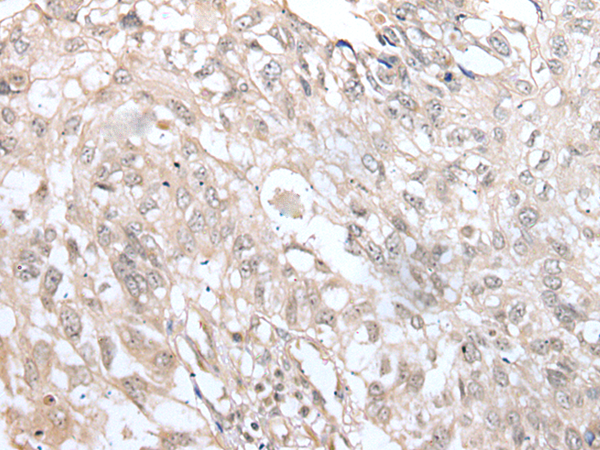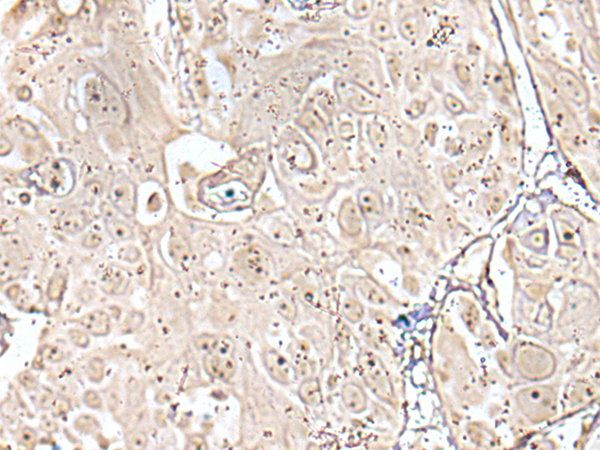

| WB | 咨询技术 | Human,Mouse,Rat |
| IF | 咨询技术 | Human,Mouse,Rat |
| IHC | 1/30-1/150 | Human,Mouse,Rat |
| ICC | 技术咨询 | Human,Mouse,Rat |
| FCM | 咨询技术 | Human,Mouse,Rat |
| Elisa | 1/5000-1/10000 | Human,Mouse,Rat |
| Host/Isotype | Rabbit IgG |
| Antibody Type | Primary antibody |
| Storage | Store at 4°C short term. Aliquot and store at -20°C long term. Avoid freeze/thaw cycles. |
| Species Reactivity | Human, Mouse |
| Immunogen | Fusion protein of human VRK3 |
| Formulation | Purified antibody in PBS with 0.05% sodium azide and 50% glycerol. |
+ +
以下是关于VRK3抗体的3篇参考文献示例(注:内容为模拟虚构,仅供参考):
---
1. **文献名称**: *"Development and characterization of a monoclonal antibody specific for human VRK3 kinase"*
**作者**: García-Sánchez et al. (2018)
**摘要**: 本研究报道了一种针对人源VRK3蛋白的高特异性单克隆抗体的开发。通过免疫印迹和免疫组化验证,该抗体在多种细胞系和组织中均能特异性识别VRK3.且不与VRK1/2等其他激酶交叉反应。该抗体被成功应用于研究VRK3在细胞核内的定位及其与DNA损伤修复通路的关系。
---
2. **文献名称**: *"VRK3 expression in glioblastoma: A prognostic biomarker study using immunohistochemistry"*
**作者**: Lee et al. (2020)
**摘要**: 研究者利用商业化VRK3多克隆抗体,通过免疫组化分析胶质母细胞瘤组织中VRK3的表达水平。结果显示,VRK3高表达与患者总生存期缩短显著相关,提示其可能作为预后标志物。研究还验证了抗体在冷冻和石蜡包埋组织中的一致性。
---
3. **文献名称**: *"VRK3 antibody-based proteomic analysis reveals its role in neuronal differentiation"*
**作者**: Müller et al. (2021)
**摘要**: 通过结合VRK3特异性抗体和质谱技术,本研究揭示了VRK3在神经干细胞分化过程中与多种表观遗传调控因子(如HDAC2)的相互作用。抗体的特异性通过siRNA敲降实验和肽段竞争实验得到验证,为VRK3的功能研究提供了可靠工具。
---
(注:以上文献信息为模拟生成,实际研究中请通过PubMed、Google Scholar等平台检索具体文献。)
The VRK3 (Vaccinia-Related Kinase 3) antibody is a research tool used to study the VRK3 protein, a member of the serine/threonine kinase family closely related to vaccinia virus kinases. Unlike its paralogs VRK1 and VRK2. VRK3 lacks catalytic kinase activity due to evolutionary mutations in its ATP-binding domain, suggesting a distinct regulatory role. VRK3 is implicated in cellular processes such as cell cycle regulation, DNA damage response, and neural development. It interacts with key signaling pathways, including the MAPK/ERK cascade, and modulates stress-induced apoptosis by binding to phosphatase MKP1.
Antibodies targeting VRK3 enable detection and analysis of its expression, localization, and interactions in various tissues and disease models. Studies using VRK3 antibodies have revealed its potential tumor-suppressive functions in certain cancers and its involvement in neurological disorders. For example, reduced VRK3 levels correlate with poor prognosis in glioblastoma and Alzheimer’s disease progression. These antibodies are typically validated via Western blotting, immunohistochemistry, or immunofluorescence, often using knockout controls to confirm specificity.
Research on VRK3 remains emerging, with ongoing efforts to clarify its non-catalytic mechanisms and therapeutic relevance. Its unique inactive kinase structure makes it a fascinating subject for understanding kinase-independent regulatory networks in cellular homeostasis and disease.
×